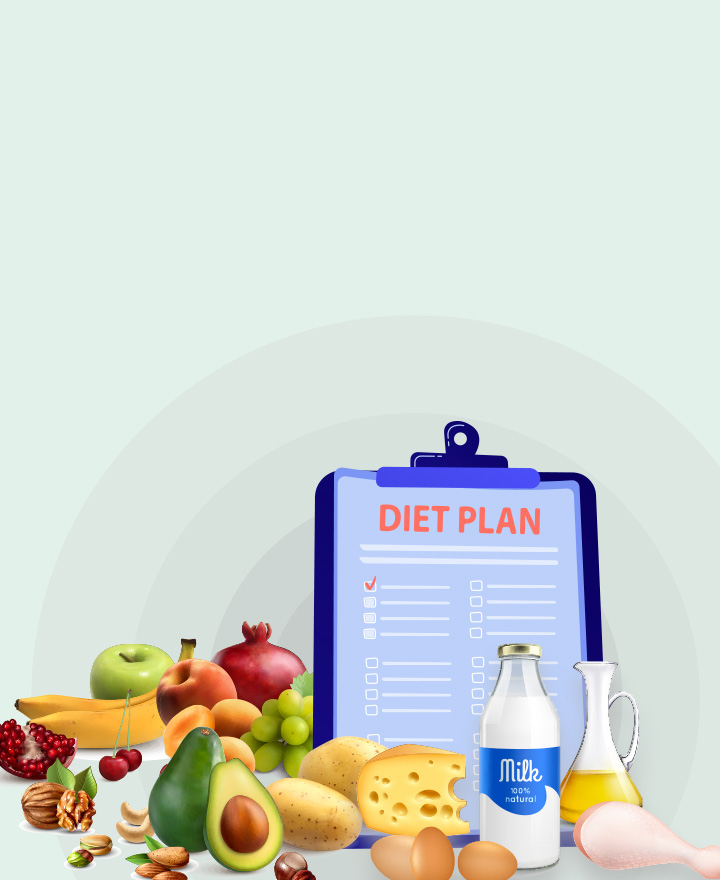

No-Sugar Diet: Making a Plan to Eat Less Sugar
Craving sweetness is natural, yet excessive sugar intake can lead to health issues. Instead of eliminating sugar, you can gradually reduce your sugar intake, eventually moving towards a no-sugar diet. While adopting a no-sugar diet may seem daunting, by following few tips you can work your way towards a healthier you. Read on to know more.
Tips to Help you Get Started
Here are some ways through which you can cut down on your sugar intake:
1. Start Gradually:
Instead of making drastic changes that can be overwhelming, make small, sustainable changes in your daily routine. Here are some ways to begin with:
• Cut back on added sugar in coffee, tea, and cereal.
• Swap sugary drinks for water or unsweetened alternatives.
• Sweeten plain yoghurt with fruit or spices, not sugar.
• Choose fresh fruits over dried fruits; be mindful of portions.
• Check food labels for lower sugar content. Beware of hidden sugars such as high fructose corn syrup and malto dextrin.
2. Avoid the obvious sugar source:
This includes sugary sweets such as cake, muffins, cookies, ice-cream and sorbet. Over and above you can also avoid food items which are high in natural sugar. This includes dry fruits like dates and raisins, milk, yogurt with added flavours.
3. Check Food Labels:
There is hidden sugar in several food products available in market and the best way to find this out is by reading the food labels for its nutritional information and ingredient details. For instance, hidden sugar is found in baked beans, tacos, boxed rice, frozen food, crackers, and grains like wheat, rice, and pasta.
4. Know the code names for sugar:
Sugar is available in various forms and to remove it completely from your diet, you need to know them all. Easiest way is to watch out for ingredients ending from ‘ose’ as these are usually forms of sugar. For example, glucose, sucrose, fructose, maltrose, dextrose, and lactose are all forms of sugar.
5. Avoid artificial sweeteners:
Sugar substitutes are sweeter than real sugar by almost 200 to 13,000 times, and incorporating this in your diet can make it harder for you to stick to a no-sugar diet in longer run. Common artificial sweeteners include stevia, equal, sweet ‘n low, splenda, and nutrasweet. These substitutes are found in products which are known to be no-sugar, low-sugar, or low-calorie.
6. Explore savoury flavor:
Enhance your food flavor by adding herbs and spices like cinnamon, ginger, turmeric, nutmeg, paprika, or chill flakes. These ingredients will not only enhance flavour of your food, but they also offer other health benefits.
7. Avoid sweetened drinks:
It not just what you eat, but what you drink is also very important. This not only includes soft drinks, soda, fruits juices, and flavoured milk/coffee, but even cocktails and liqueurs are high in sugar content.
8. Opt for whole-foods and nutrient-dense food options:
Whole and unprocessed foods are naturally low in sugar and are packed with essential nutrients like vitamins, minerals, and fiber.
Conclusion
By incorporating these tips into your routine, you can successfully reduce your sugar intake. Remember, consistency is key and even small changes can make a big difference on your journey towards a healthier you.
One of the important components of our overall wellness is also being financially secured. Healthcare emergencies can happen any time, but a good health insurance policy can protect you from such uncertain situations. To know more about Wellness and other health related tips, visit the wellness corner.
Source: healthline.com, truvitals.in
Disclaimer: This blog provides general information and discussions about health and related subjects. The information and other content provided in this blog, website or in any linked materials are not intended and should not be considered, or used as a substitute for, medical advice, diagnosis or treatment. Kindly contact your Doctor before starting a new medicine or health regime.
Related Articles
How to keep track of your diet
Important diet questions to ask
These Foods Can Help Control The Cholesterol In Your Diet!
Published on April 24, 2024














 Health Insurance
Health Insurance  Travel Insurance
Travel Insurance  Car Insurance
Car Insurance  Cyber Insurance
Cyber Insurance  Critical Illness Insurance
Critical Illness Insurance
 Pet Insurance
Pet Insurance
 Bike/Two Wheeler Insurance
Bike/Two Wheeler Insurance  Home Insurance
Home Insurance  Third Party Vehicle Ins.
Third Party Vehicle Ins.  Tractor Insurance
Tractor Insurance  Goods Carrying Vehicle Ins.
Goods Carrying Vehicle Ins.  Passenger Carrying Vehicle Ins.
Passenger Carrying Vehicle Ins.  Compulsory Personal Accident Insurance
Compulsory Personal Accident Insurance  Travel Insurance
Travel Insurance  Rural
Rural